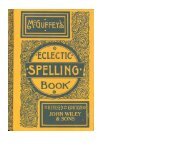WINE, WOMEN, AND SONG. - The Language Realm
WINE, WOMEN, AND SONG. - The Language Realm
WINE, WOMEN, AND SONG. - The Language Realm
You also want an ePaper? Increase the reach of your titles
YUMPU automatically turns print PDFs into web optimized ePapers that Google loves.
<strong>The</strong> servants carry to and fro<br />
Dishes and cups of ruddy glow;<br />
But these delights, I will confess,<br />
Than pleasant converse charm me less;<br />
Nor is the feast so sweet to me<br />
As dear familiarity.<br />
[13]<br />
"<strong>The</strong>n come now, sister of my heart,<br />
That dearer than all others art,<br />
Unto mine eyes thou shining sun,<br />
Soul of my soul, thou only one!<br />
I dwelt alone in the wild woods,<br />
And loved all secret solitudes;<br />
Oft would I fly from tumults far,<br />
And shunned where crowds of people are.<br />
O dearest, do not longer stay!<br />
Seek we to live and love today!<br />
I cannot live without thee, sweet!<br />
Time bids us now our love complete.<br />
Why should we then defer, my own,<br />
What must be done or late or soon?<br />
Do quickly what thou canst not shun!<br />
I have no hesitation."<br />
From Du Méril's collections further specimens of thoroughly secular poetry might be culled.<br />
Such is the panegyric of the nightingale, which contains the following impassioned lines:[4]—<br />
"Implet silvas atque cuncta modulis arbustula,<br />
Gloriosa valde facta veris prae laetitia;<br />
Volitando scandit alta arborum cacumina,<br />
Ac festiva satis gliscit sibilare carmina."<br />
Such are the sapphics on the spring, which, though they date from the seventh century, have a<br />
truly modern sentiment of Nature. Such, too, is the medieval legend of the SnowChild, treated<br />
comically in burlesque Latin verse, and meant to be sung to a German tune of love[14]—<br />
Modus Liebinc. To the same category may be referred the horrible, but singularly striking, series<br />
of Latin poems edited from a MS. at Berne, which set forth the miseries of monastic life with<br />
realistic passion bordering upon delirium, under titles like the following—Dissuasio Concubitûs<br />
in in Uno tantum Sexu, or De Monachi Cruciata.[5]<br />
FOOTNOTES:<br />
[1] Du Méril, Poésies Populaires Latines Antérieures au Deuxième: Siècle, p. 240.<br />
[2] Du Méril, op. cit., p. 239.



